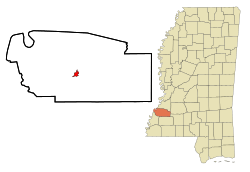Fayette, Mississippi facts for kids
Quick facts for kids
Fayette, Mississippi
|
|
|---|---|

Location of Fayette, Mississippi
|
|
| Country | United States |
| State | Mississippi |
| County | Jefferson |
| Government | |
| • Type | Mayor-Alderman |
| Area | |
| • Total | 1.18 sq mi (3.04 km2) |
| • Land | 1.18 sq mi (3.04 km2) |
| • Water | 0.00 sq mi (0.00 km2) |
| Elevation | 282 ft (86 m) |
| Population
(2020)
|
|
| • Total | 1,445 |
| • Density | 1,228.74/sq mi (474.56/km2) |
| Time zone | UTC-6 (Central (CST)) |
| • Summer (DST) | UTC-5 (CDT) |
| ZIP codes |
39069, 39081
|
| Area code(s) | 601 |
| FIPS code | 28-24500 |
| GNIS feature ID | 0669927 |
| Website | Town of Fayette |
Fayette is a city in Jefferson County, Mississippi, United States. It is the main town of Jefferson County. In 2020, about 1,445 people lived there.
Contents
History of Fayette
Early Events in Fayette
In 1879, a famous outlaw group called the Jesse James gang came to southwest Mississippi. They robbed a store in Fayette and another nearby. The gang took about $2,000 in cash. They then hid in some old cabins in Louisiana. A group of lawmen tried to catch them. They killed two of the outlaws, but Jesse James and most of his gang got away. Jesse James was killed three years later in 1882.
Voting Rights and Change
For many years, it was very hard for African Americans in Mississippi to vote. This changed after a new law, the Voting Rights Act of 1965, was passed. This law made sure that all citizens could register and vote.
After this law, African Americans in Fayette began to register and vote. In 1969, Charles Evers was elected as mayor of Fayette. He was the first African-American mayor elected in Mississippi after the Reconstruction era. He won against the white mayor at the time. Charles Evers was an important activist. He was also the brother of Medgar Evers, a civil rights leader who was sadly killed in 1963.
Where is Fayette?
Fayette is located at 31°42′40″N 91°3′44″W / 31.71111°N 91.06222°W. This means it is in the southwestern part of Mississippi.
The city covers a total area of about 1.2 square miles (3.04 square kilometers). All of this area is land.
People in Fayette
The population of Fayette has changed over the years. Here's how many people have lived in Fayette during different census counts:
| Historical population | |||
|---|---|---|---|
| Census | Pop. | %± | |
| 1850 | 210 | — | |
| 1860 | 339 | 61.4% | |
| 1870 | 120 | −64.6% | |
| 1880 | 369 | 207.5% | |
| 1900 | 604 | — | |
| 1910 | 775 | 28.3% | |
| 1920 | 840 | 8.4% | |
| 1930 | 848 | 1.0% | |
| 1940 | 907 | 7.0% | |
| 1950 | 1,498 | 65.2% | |
| 1960 | 1,626 | 8.5% | |
| 1970 | 1,725 | 6.1% | |
| 1980 | 2,033 | 17.9% | |
| 1990 | 1,853 | −8.9% | |
| 2000 | 2,242 | 21.0% | |
| 2010 | 1,614 | −28.0% | |
| 2020 | 1,445 | −10.5% | |
| U.S. Decennial Census | |||
As of the 2020 United States census, there were 1,445 people living in Fayette. There were 510 households and 291 families in the city.
Education in Fayette
The schools in Fayette are part of the Jefferson County School District.
Famous People from Fayette
Many notable people have connections to Fayette:
- Albert Clark - A baseball player in the Negro league.
- Charles Evers - The first African-American mayor in Mississippi after the Reconstruction era.
- Thomas M. Green Jr. - A member of the U.S. House of Representatives in the early 1800s. He built Springfield Plantation in Fayette.
- Dudley Guice Jr. - A former National Football League player.
- Alvin Hall - A former defensive back for the Los Angeles Rams.
- Richard H. Truly - The eighth administrator of NASA.
- Thomas M. Wade - A politician and educator from Louisiana, born near Fayette.
See also
 In Spanish: Fayette (Misisipi) para niños
In Spanish: Fayette (Misisipi) para niños
 | Delilah Pierce |
 | Gordon Parks |
 | Augusta Savage |
 | Charles Ethan Porter |


